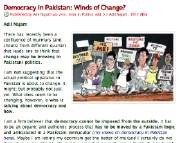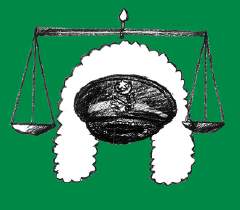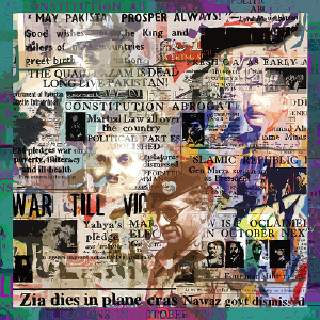It is impossible to ponder upon the meaning of Pakistan Day without thinking of the events happening in Pakistan right now. We are living through a historic moment, but probably not for the reason many people think it is. The debacle about the removal of the Chief Justice of Pakistan and the protests and clampdown that has followed has, naturally, been viewed and discussed in the context of ‘current’ events. This is as one would expect and, maybe, as it should be. However, maybe today is also a good day to think about what all of this means to the future of our polity.
![]()
Gen. Musharraf himself, and his supporters, view this as a conspiracy against his person. It may not be a conspiracy but his opponents certainly view this as an opportunity to bring an end – or at least seriously dent – his regime. There are, of course, also those who view – or wish to construct – Chief Justice Iftikhar Chaudhry as an arch villain or as a supreme here. He is probably neither, but as a man caught in the cross-hairs of history he is well aware of the pivotal role that his person plays out in this unfolding saga. All others – whether it be Nawaz Sharif and Benazir Bhutto on the outside or Shaukat Aziz and Chaudhry Shujaat on the inside – are using survivalist tactics in a situation that remains unstable and gives no real indications of how it might end. None of this, of course, is unreasonable on the part of those concerned. Nor is it unreasonable that they media and the public discourse fetishizes about the minutia of these interactions.
However, I believe that the larger story here is about none of the above. This is not just about what Gen. Musharraf did, not about how Iftikhar Chaudhry reacted; the real story is about how the citizenry of Pakistan reacted. There is little surprise in either the actions of Gen. Musharraf or the reaction of the Chief Justice. The surprise lies in how people reacted – Lawyers on the street, media in their newsrooms, bloggers in bloggistan, and ordinary citizens everywhere in their thaRRas, drawing rooms, email lists and everywhere else.
That is ultimately what matters. If this spirit can be sustained then the future of democracy in Pakistan is secure; whether it comes with or without the current setup. If indeed, Gen. Musharraf believes in democracy, as he says, then let him be the one to read what is on the wall and usher it in; if he does so he will have a place in history unlike that of any other military ruler of Pakistan. If not, it is now clear that the spirit will thrive despite him.
 As I have argued elsewhere on ATP, this has been Pakistan’s democratic moment; that I find it to be a moment worthy of celebration because it signifies that trapped inside an “undemocratic state” lies a vibrant and clearly “democratic society” (see my argument here). Of course, this is not a new argument for me to be making. Back in July, I had argued here on ATP that maybe the ‘Winds of Change’ in terms of democracy are beginning to gather momentum. I had argued then:
As I have argued elsewhere on ATP, this has been Pakistan’s democratic moment; that I find it to be a moment worthy of celebration because it signifies that trapped inside an “undemocratic state” lies a vibrant and clearly “democratic society” (see my argument here). Of course, this is not a new argument for me to be making. Back in July, I had argued here on ATP that maybe the ‘Winds of Change’ in terms of democracy are beginning to gather momentum. I had argued then:
There has recently been a confluence of murmurs (and shouts) from different quarters that leads one to think that change may be brewing in Pakistani politics. I am not suggesting that the actual political apparatus in Pakistan is about to change. It might; but probably not just yet. What does seem to be changing, however, is who is talking about democracy and how… Maybe I am letting my optimism get the better of me (and I certainly do not think that we are “there” yet), but it seems that an indigenous logic, demand, and vernacular for meaningful democracy in Pakistan is beginning to take shape and, maybe, maybe, maybe, even catch momentum… It is the internal demand, the indigenous logic, and the Pakistani vernacular of democracy that is to be celebrated. I doubt if Gen. Musharraf is likely to take advice from me. But if we were listening, I would suggest to him that he should pay close attention to this vernacular. (See full post here)
 That may have been a premature proclamation, but I do feel that what we are seeing now is a development in the same progression. I am always bullish on democracy in Pakistan, and the prognosis for me this March 23 is that democratic spirit remains alive and well in Pakistan. Indeed, this last week we have seen it at its most vibrant on the streets of the country. It is from this spirit that the construction of the reality will emerge. I stand committed to what I had written in an op-ed in The News back in 2004:
That may have been a premature proclamation, but I do feel that what we are seeing now is a development in the same progression. I am always bullish on democracy in Pakistan, and the prognosis for me this March 23 is that democratic spirit remains alive and well in Pakistan. Indeed, this last week we have seen it at its most vibrant on the streets of the country. It is from this spirit that the construction of the reality will emerge. I stand committed to what I had written in an op-ed in The News back in 2004:
…there is the much-maligned argument that Pakistan’s history proves that democracy has not worked in Pakistan. This is total nonsense. If one looks at Pakistan’s history, all one finds is vast periods of non-democracy – mostly under non-elected rule, but often also under elected rule. Empirically, the only thing that one can say on the basis of this history is that non-democracy does not work in Pakistan. As one surveys the socio-political landscape one finds the country in the grips of poverty, disease, despair, sectarianism, extremism, violence, and much more. But none of these can be blamed on democracy, simply because we have never really allowed meaningful democracy for any meaningful period of time. There are many things that don’t work in Pakistan, but all evidence suggests that democracy is not one of them. At least, not yet. (See full op-ed here).
On this March 23rd, I am more confident than ever that not only can democracy work in Pakistan, it is the only thing that can. Whether our elites recognize it or not, the democratic spirit of the people can neither be tamed nor contained. Not any more.
To end, let me leave you with two things. First, since we are discussing Iqbal in a separate post, here is a verse from his poem ‘March 1907’ (it is about a different revolution, but the month is appropriate):
Guzar gaya ab woh daur saqi kay chup kay peetay thay peenay waalay
banay gaa saara jahaN mai-khaana, har ki baada khaar hoo ga
The second is the recording of a song (a taraana) that a reader sent me. He calls it the ‘Intellectual’s Anthem,’ and it really is set like an anthem… maybe too much so. But that is what catches you. Hear beyond the tune and focus on the words…
[audio:/audio/Intellectuals-anthem.mp3]The words, I am told, are by famous Sindhi poet Sheikh Ayaz, the song was part of an album by the group Voices in the mid-1980s and was a project overseen by another legendary figure, Aslam Azhar. Take a listen.
Artwork Credit: Abro at Flick



















































Do you know the real reason behind we the people of Pakistan are so democratic. It is all because of our forefathers’ untiring efforts of earning a separte homeland that gave us the freedom of excercising our rights in our free country. In the website http://www.heritageonline.com.pk you will find deep detailed information about the struggles of our great leaders.
Omer R. In our discussions we gave you well deserved compliments on your pieces and I think here you have Reciprocated in kind.
The News, March 25, 2007
RIPPLE EFFECT
The rise of the ‘new media’
By Omar R. Quraishi
The events of the past couple of weeks suggest that the so-called ‘new media’ has well and truly arrived with a bang in Pakistan, and that’s perhaps the positive thing to have emerged out of the current crisis. By new media, one obviously is referring to the electronic media, to cable television and more importantly to the Internet and the various ways in which it allows users to provide and access information.
The rise of the new media is important because it provided a platform for the many disparate segments of civil society who all came together through experiencing it (either in the form of watching live coverage of the police lathi-charging unarmed defenceless lawyers or plainclothes intelligence sleuths posted at the gate of Justice Iftikhar Chaudhry’s residence stopping visitors). Perhaps the best example of this (and one doesn’t want to come across as blowing one’s trumpet) was the live coverage shown by various TV channels, particularly GEO and followed closely by AAJ TV and others of the happenings in Islamabad in and around the Supreme Court building on March 16. This of course led to the unbridled assault on the offices of the TV channel and of this newspaper in a building that couldn’t be a few hundred yards away from the seat of government and parliament. All this was shown live on television — and one can imagine the impact that it would have made if it were not shown live in real time.
A lot has already been written on the attack and on the possible motives — the president has apologised and the prime minister even visited the offices of the TV channel and the newspaper but the question still remains: how could the police have done this on their own, and who were they receiving orders from on their walkie-talkies, as reported by many eyewitnesses, and if they didn’t do it on their own, who are the people behind the attack? Also, will a tribunal formed at the additional sessions judge level have the requisite courage and authority to come to a fair assessment as to the possible identities of those who ordered the attacker.
One thing that I would like to say here is that some people in cyberspace and in online web forums have actually tried to justify the attack by saying that the channel should have known better than to be broadcasting what it did. This is probably the view of the government and its apologists as well. The fact of the matter is they should know that the job of the media — anywhere and not just in Pakistan — is to try and show events and incidents, and clearly the police engaged in a street battle with civilian protesters qualifies as extremely newsworthy footage. After all, the footage showed policemen picking up stones and throwing them at random at the protesters — so the people of this country finally got to see for themselves their conduct for themselves (perhaps the attack on GEO showed this in more stark fashion).
Of course, in all of this, one shouldn’t forget the blogging world, which though still small seems to have matured in Pakistan. There are several sites — my personal favourites have been http://www.pakistaniat.com and http://www.karachi.metblogs.com — which have been carrying lively discussions and exchanges regarding the current crises. Both these have also been carrying footage of the lathi-charges, of the attack on GEO and The News and also the now famous (or should one say infamous) exchange between Ansar Abbasi and Law Minister Wasi Zafar on a Voice of America radio show where the minister proceeded to tell the journalist what he would do with his (the minister’s) ‘big arm’. There is the medium of the SMS (short message service) as well, which has now become a handy means of communication in most Pakistani cities and used by people regardless of financial standing.
It can’t be said that the advent of the new media was the reason for the near unanimity that has been seen in the response by Pakistanis in general to the ‘suspension’ of the chief justice and the attack on the press and media, but it has certainly helped crystallise it. Clearly, from the point of view of those in the government and the establishment who would like to see the media be put in its place (read submissive and deferential to the government’s wishes) had not envisaged that new technology brings with it its own democratising possibilities and opportunities. That has been particularly true in the case of the Internet since it isn’t known as the Great Leveller for nothing — a truly democratic way for people to communicate and to provide and access information.
And the best part of this all is that the new media is very much here to stay. Perhaps, newspapers and TV channels (though none have done this so far in Pakistan) need to begin their own blogs soon.
The writer is Op-ed Pages Editor of The News.
Email: omarq@cyber.net.pk
Good post Adil. I remember during Nawaz’s time there were religious parties openly requesting Army to take over and “save Pakistan.” A large segment of population also wanted jehad mafia to come forward and lead and so they did. If it were not for 911 incident, our landscape would have been very different and more bloody. This is a golden opportunity to put country on right tracks.
However military has entrenched itself so deep in our psyche that it will take a very long time to overcome its influence. Civilian politicians have been a disappointment – tragic perhaps but without establishing strong institutions we will again end up with half baked democracy.
As far as our judiciary is concerned – well, we have constituional experts like Sharif ud Din Pirzada who operate in 256 shades of grey and can perform magic that can blind any chief justice – can such an institution be trusted?
[quote comment=”39639″]Very nice sentiments. Ameen to all you say.
Now only if our politicians could also think like that.
Why don’t people like you in politics![/quote]
Please forgive me for saying so, a lot of people make such comments asking others to take up politics, but when someone comes forward and when the elections approach, votes and other help in campaigning/propagating the message is never forthcoming.
One of the most ridiculous remarks that is often made about Imran Khan is something like “yeh siasat main kahan say aa gaya”
So before asking Prof Adil Najam to join politics, lets first honestly ask ourselves whether we would really support him if he were to do so or whether we would only make sarcastic remarks like the ones made about Imran Khan.
Adil can speak for his own personal reasons for not being in politics (if he wants to get into this discussion at all), but the general answer to why good people avoid politics also has something to do with our lack of support for them. We yearn for good leadership but our votes are reserved for the same discredited lot.